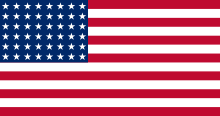1918 in the United States
| 1918 in the United States | |
|---|---|
| Years: | 1915 1916 1917 – 1918 – 1919 1920 1921 |
|
| |
 48 stars (1912–59) | |
|
Timeline of United States history
| |
Events from the year 1918 in the United States.
Incumbents
Federal Government
- President: Woodrow Wilson (Democratic)
- Vice President: Thomas R. Marshall (Democratic)
- Chief Justice: Edward Douglass White
- Speaker of the House of Representatives: Champ Clark (D-Missouri)
- Congress: 65th
Events
January–March
- January 8 – Woodrow Wilson delivers his Fourteen Points speech.
- March 4 – A soldier at Camp Fuston, Kansas falls sick with the first confirmed case of the Spanish flu.
- March 19 – The U.S. Congress establishes time zones and approves daylight saving time (DST goes into effect on March 31).
April–June
- May 2 – General Motors acquires the Chevrolet Motor Company of Delaware.
- May 15 – The United States Post Office Department (later renamed the United States Postal Service) begins the first regular airmail service in the world (between New York City, Philadelphia and Washington, DC).
- May 16 – The Sedition Act of 1918 is approved by the U.S. Congress.
- May 20 – The small town of Codell, Kansas is hit for the third year in a row by a tornado. Coincidentally, all three tornadoes hit on May 20, 1916, 1917, and 1918 respectively.
- June 22 – Suspects in the Chicago Restaurant Poisonings are arrested, and more than 100 waiters are taken into custody, for poisoning restaurant customers with a lethal powder called Mickey Finn.
July–September
- July 9 – Great train wreck of 1918: In Nashville, Tennessee, an inbound local train collides with an outbound express, killing 101.
- August – A deadly second wave of the Spanish flu starts in France, Sierra Leone, and the United States.[1]
- September 11 – The Boston Red Sox defeat the Chicago Cubs for the 1918 World Series championship, their last World Series win until 2004.
October–December
- October 8 – World War I: In the Forest of Argonne in France, U.S. Corporal Alvin C. York almost single-handedly kills 25 German soldiers and captures 132.
- October 11 – The city of Mayagüez, Puerto Rico and other adjacent towns are nearly destroyed by an 7.5 earthquake and a tsunami.
- October 12 – 1918 Cloquet Fire: The city of Cloquet, Minnesota and nearby areas are destroyed in a fire, killing 453.
- October 25 – The SS Princess Sophia sinks on Vanderbilt Reef near Juneau, Alaska; 353 people die in the greatest maritime disaster in the Pacific Northwest.
- November 1 – Malbone Street Wreck: The worst rapid transit accident in world history occurs under the intersection of Malbone Street and Flatbush Avenue, in Brooklyn, New York City, with at least 93 dead.
- December 4 – President of the U.S. Woodrow Wilson sails for the Paris Peace Conference, becoming the first U.S. president to travel to Europe while in office.
- December 19 – Ripley's Believe It or Not! first appears as a cartoon under the title Champs and Chumps in The New York Globe.
Undated
- The Native American Church is formally founded.
- The Association Against the Prohibition Amendment is founded to stop Prohibition in the U.S.
- The last captive Carolina Parakeet (the last breed of parrot native to North America) dies at the Cincinnati Zoo .
- The World Tomorrow pacifist magazine begins publication.
Ongoing
- Progressive Era (1890s–1920s)
- Lochner era (c. 1897–c. 1937)
- U.S. occupation of Haiti (1915–1934)
- World War I, U.S. involvement (1917–1918)
- First Red Scare (1917–1920)
Births
- January 21 – Richard Winters, World War II soldier (died 2011)
- March 17 – Ross Bass, United States Senator from Tennessee from 1964 till 1967. (died 1993)
- May 21 – Lloyd Hartman Elliott, educator and former president of George Washington University (died 2013)
- August 21 – Bruria Kaufman, American-born Israeli physicist (died 2010)
- November 3 – Russell B. Long, United States Senator from Louisiana from 1948 till 1987. (died 2003)
- November 7 – Rev. Billy Graham, "America's pastor."
- December 4 – Albert Francis Capone, son of Al Capone (died 2004)
Deaths
- April 14 – James E. Ware, architect who devised the "dumbbell plan" for New York City tenements (born 1846)
- June 4 – Charles W. Fairbanks, 26th Vice President of the United States from 1905 till 1909 and United States Senator from Indiana from 1897 to 1905. (born 1852)
- August 10 – William Pitt Kellogg, United States Senator from Louisiana from 1868 till 1872 and from 1877 till 1883. (born 1830)
- September 12 – Joseph Clay Stiles Blackburn, United States Senator from Kentucky from 1885 till 1897 and from 1901 till 1907. (born 1838)
- October 8 – James B. McCreary, 27th and 37th Governor of Kentucky from 1875 till 1879 and from 1911 till 1915, United States Senator from Kentucky from 1903 till 1909. (born 1838)
References
- ↑ UK Parliament - http://www.parliament.the-stationery-office.com/pa/ld200506/ldselect/ldsctech/88/88.pdf. Accessed 2009-05-06. Archived 2009-05-08.
External links
-
 Media related to 1918 in the United States at Wikimedia Commons
Media related to 1918 in the United States at Wikimedia Commons - "1918". Timeline. Digital Public Library of America.
| ||||||||||
